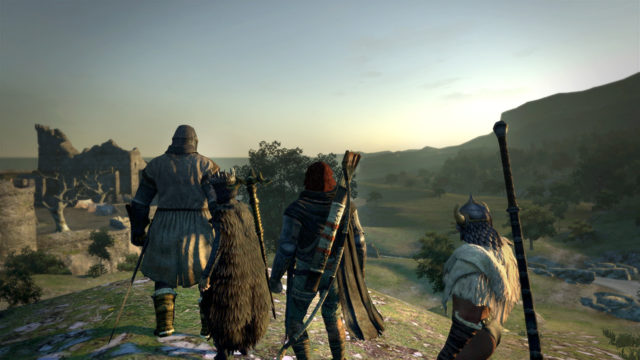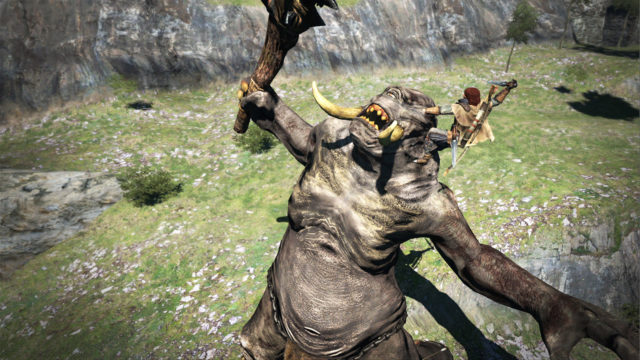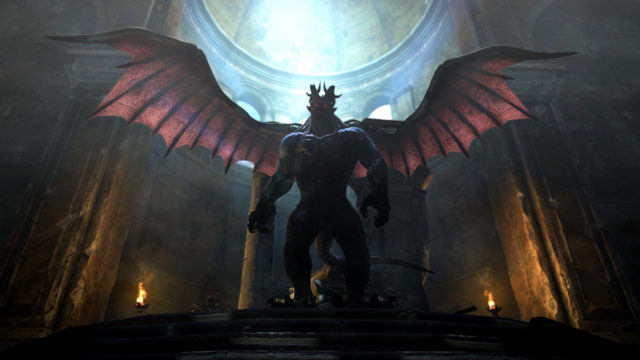Epic Western style fantasy from Japan; rewarding customization and combat mechanics; great atmospheric lighting; loads of content
Sometimes a little too generic fantasy in terms of story, setting, visuals, and audio; overly complex menus; visuals sometimes show their age
Nintendo’s past struggles with third party support often resulted in their systems being relatively light in certain genres, such as big, epic RPGs. Yes, there were plenty of niche JRPGs on 3DS and Monolith Soft has been a reliable partner, but bigger publishers were much less consistent. However, now that Switch has cemented itself as a success, many big, story-driven quests are finding their way to the hybrid system. The almost ubiquitous Skyrim finally made its way to a Nintendo console, Square Enix has released a deluge of Final Fantasy titles, and now Capcom has brought over a surprisingly quirky, but no less epic game from last generation, Dragon’s Dogma.
The distinction between Western RPGs and JRPGs is quite interesting, with the former often adhering more to classic fantasy or sci-fi elements and open structures, while the latter embraces a more linear approach to storytelling and outlandish art direction drawing inspiration from just about every imaginable genre and setting. However, Dragon’s Dogma: Dark Arisen was made in Japan by Japanese developers but obviously aspires to be more of a Western style RPG. While there are definitely some quirks that betray its origin, Capcom mostly succeeded in their efforts to create a high fantasy epic.
The game opens in the past with a group of adventurers delving into a dangerous dungeon in pursuit of a dragon, a short bit that helps establish the world, gameplay, and how dragons are very much a big deal. After a few combat encounters, the story jumps forward to where we’ll spend the rest of the game. You create your character and then jump into his or her life in a peaceful fishing village. But we don’t experience that tranquility for long, for another dragon has been released upon the world and it has chosen your home as its first target. Mixing bravery and foolishness, you grab a sword and attack the dragon, an effort made entirely in vain. This display impresses the dragon enough to make him not kill you outright; instead, he devours your heart, an action that turns you into an Arisen, an individual destined to pursue and attempt to slay the dragon that took their heart. So, yeah, a very high fantasy set-up.

As is often the case, the ensuing story is perfectly okay as it gives you a reason to explore the world and learn about the many political, historical, and magical factors shaping it. Pursuing the dragon and learning about why it appeared is fine, but the side stories and the general lore of the world often prove more interesting, though that’s not really a problem. This means one can easily get distracted from the main (and supposedly more pressing) quest, but that’s more or less the norm for these sorts of games.
The game does differ from some genre heavyweights, like Skyrim, in that it isn’t quite as open world so much as it is a number of somewhat disparate regions interconnected by more linear sections. This, along with the fact that areas are gated by certain factors such as story events or enemy levels, does give the game a more focused direction, though there is still plenty of freedom afforded as there are side quests aplenty and the world is still full of nooks and crannies worth exploring. Interestingly, traversing the world is made a little more trying as fast travel points need to be created by the player through the use of consumable items, which means you can’t just warp around wherever you want like in many other games. On the one hand, this can be a little tiresome, but it actually works well considering other gameplay decisions the developers made.
While the setting and style of Dragon’s Dogma is drawing plenty of inspiration from other sources, the core gameplay is actually rather unique and quite in-depth compared to many of its genre kin. You choose a class or vocation from three options at the start of the game, each based on the classic warrior, archer, and sorcerer archetypes. But not that long into the game, you will gain the ability to change to new vocations that either double down on one idea or mix concepts from others. While your character has a level that grants higher base stats, your vocations also level up individually which then open new skills, of which there are a lot. For magic users, these come in the form of spells, but even for the other classes they represent new attacks that include a surprising variety of maneuvers that seem more like something from a dedicated action game. Compared to the relatively simple melee and archery combat in games like Skyrim, this is a great change of pace.

The greater breadth of combat skills then feed into the combat system which is simultaneously more action focused while also being very strategic. While it feels like a hack-n-slash at times, you’ll often need to think about status effects, elemental weaknesses, and aggro management like in a more tactical RPG. This variety in skills also helps differentiate the vocations as each present a radically different approach to combat. Another nice, and very unique, addition to battles is your ability to grapple foes. For enemies who are your size or smaller, this often means holding them in place so party members can land an easy blow, but for large enemies this means grabbing onto and literally climbing them so you can repeatedly smack them, hopefully in a hard to reach weak point. These skills, grappling and running, are all managed by a stamina system similar to those found in countless games, so you’ll still need to be cautious about not leaving your character literally out of breath in the midst of a battle.
The last major facet of gameplay is party management, which could either prove amazing or frustrating depending on your preferences. As an Arisen, your character has the ability to summon pawns, people from another dimension who act as mercenaries throughout the world while also possessing a seemingly divine purpose to serve the Arisen. You’ll get to create your own custom pawn based on your any whim while the rest of your party will be filled out with pawns summoned from their strange dimension. If you’re hooked up online, you can even summon other players’ pawns and vice-versa. Dealing with skills and vocations is simple enough, but properly equipping everyone might prove annoying for some as the amount of gear you can have at once is rather impressive and daunting. You don’t just equip upper body armor, you can also equip separate shirts as well, and the same goes for below the belt. This would be quite a bit of work regardless, but the menu system doesn’t help much, as changing gear requires moving through several screens. Even shop menus prove more complex than they really need to be.
Between all of these mechanics, the main story, and the many side quests, there is plenty to do in the game. Beating the main game once will require dozens of hours with the side quests adding even more, and the many vocations and skills available make replays a very appealing option. Beyond that, the game also comes with the extra Dark Arisen expansion which actually becomes available quite early on, despite obviously being meant more for late game characters. While the main game sends you on an epic quest across a sprawling world, this material is more focused on dungeon diving in an underworld filled with the toughest encounters imaginable. It’s a really nice option for those who really want to explore the depths of the combat system.

Of course, one important aspect of an epic adventure is making it look epic, and Dragon’s Dogma generally succeeds. Look closely and you can easily tell this game was originally designed for Xbox 360 and PS3, but when you step back and watch everything in motion, it often looks quite nice. Character faces don’t hold up, but their animations do as everything has a detailed look and realistic weight to it, especially the bigger monsters, which makes the act of climbing atop them feel all the more harrowing. The best part of the visual design, however, is the lighting which is simply amazing. When you are in the wilds at night or delving into a dungeon, the darkness is incredibly oppressive, making any light, whether it be from your lantern, a fire, or the rising sun, a brilliant spectacle as it shines off reflective surfaces and casts shadows into the world. The overall art direction does take a hit for a lack of creativity, though. It’s obvious the developers were trying really hard to make a European fantasy world, but the end result looks rather generic regardless of how well it’s lit and animated.
The sound falls into a similar place as the visuals. The music is generally well done, with mostly appropriate tracks that fit the setting and mood of each location and event, but are also fairly formulaic. The exception to this is the main menu theme, along with any other lyric driven songs which do change things up but also feel slightly out of place. The sound effects are much more universally effective, as the attention to detail is absolutely fantastic. Whether it’s just the clanking of your armor as you run around or the cacophony of battle, so much of the game just sounds right. The voice acting is a little harder to judge, though. The performances are fine enough, but the dialogue is written in “ye olde English style” and that can sometimes feel a bit cheesy.
Considering the recent flood of classic Final Fantasy titles on Switch, Dragon’s Dogma is an interesting change of pace, especially considering the fact that it’s a product of a Japanese developer. The somewhat more open structure and classic fantasy setting might recall something more along the lines of Skyrim, but such a comparison really wouldn’t be accurate. While it doesn’t quite capture that game’s same sense of world and adventure, it does offer a more in-depth combat system along with more complex systems overall. This could be a double-edged sword, of course, as the micromanagement will almost certainly annoy those looking for a more streamlined adventure. Regardless of those issues, as well as the handful of visual drawbacks, Dragon’s Dogma: Dark Arisen undoubtedly stands out as a compelling adventure with a lot of original ideas in terms of its systems. So, for any hardcore RPG fan, it’s pretty darn close to a must play.
Nintendojo was provided a copy of this game for review by a third party, though that does not affect our recommendation. For every review, Nintendojo uses a standard criteria.




 ShareThis
ShareThis





